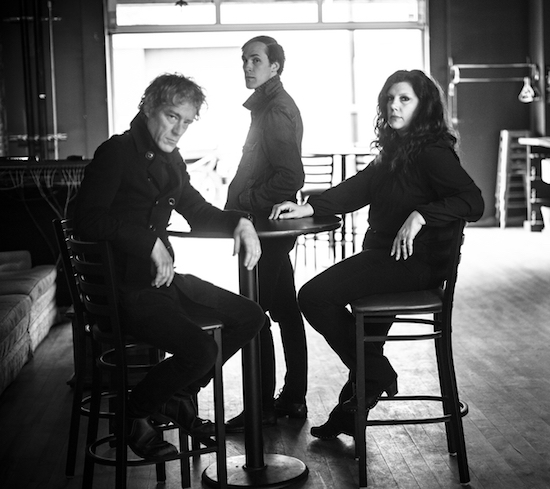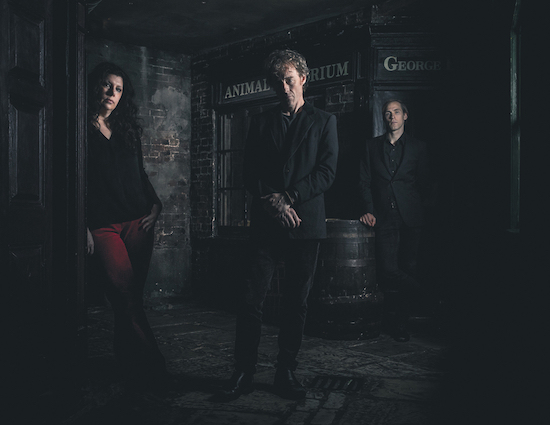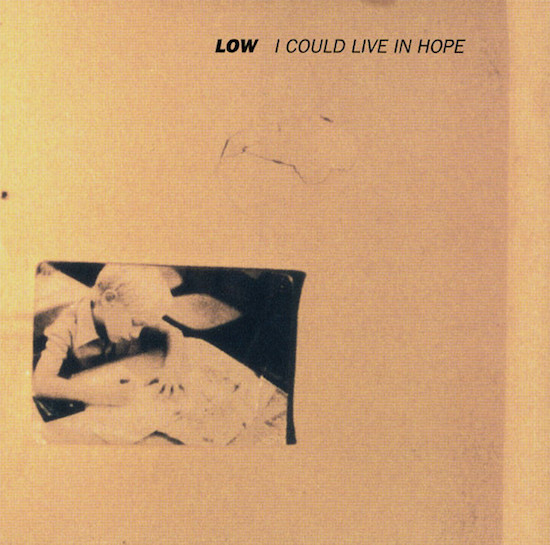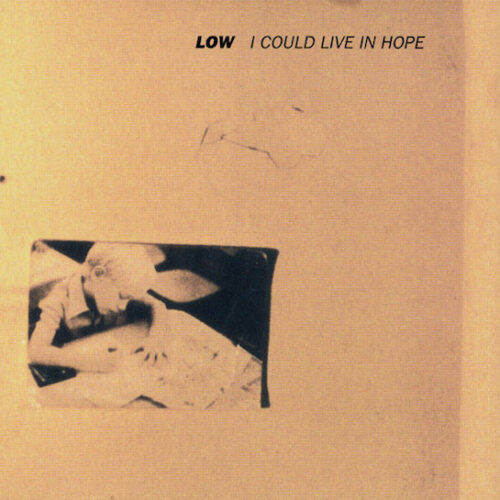“We feel like we’re on borrowed time,” jokes Low’s Alan Sparhawk, sitting in a BBC 6 Music studio in Salford, moments before they will turn the room into reverential silence with a tender yet quietly furious live session for Marc Riley. “We’ve been living with the concept of how long we’ve been going for a while. It’s weird and we didn’t expect to be around this long.”
He’s reflecting on a quarter century of Low, who on February 18, 1994 released their debut album I Could Live in Hope, a record that managed to cut through the post-Nirvana alt-rock and grunge noise by turning themselves down – way down. They combined the interweaving husband and wife vocals of Sparhawk and Mimi Parker – both forcefully beautiful in their own way, and always poised and poignantly restrained – with drums that whispered as much as they banged and guitars that shimmered with watery reverb.
The term slowcore was thrown at them jokingly by a friend but it stuck. When they appeared on the front cover of The Wire magazine in 2018, the tag “godfathers of slowcore” accompanied the feature. “Everyone wants to be the genesis of something original,” says Parker. “So it’s flattering whether or not it’s true.”
The band had the kind of year in 2018 that very few artists this far into their career could ever hope or wish for. The fractured, vocally mutilated, electronic-tinged Double Negative inadvertently became a record that represented the times. The balancing of avant-garde tendencies with skin-tingling melodies found love in just about every corner of the music world. When was the last time a band landed on the cover of The Wire, got a five star Guardian review, a best new music from Pitchfork, was awarded album of the year by Uncut – and a top 10 tQ finish – all in one year?
With that success now settled in, the pair delve further back into the earliest stages of the band and the making of their debut album. “We wanted to play minimal,” Sparhawk recalls, citing the likes of Brian Eno, La Monte Young and Joy Division as early touching points. “We were narrowing the format of a band but this was also to convince Mimi to join.” Parker’s joyously simplistic yet stirring drum parts – played having no previous experience – have been an anchor of the band’s sound since day one.
There was also a mildly combative air to the band’s approach: to turn down when everyone else was turning up. “We were a little bit facetious about it,” Sparhawk says. “We knew it would make a lot of people uncomfortable. We knew it was something that a lot of people wouldn’t like. It was thinking about doing this slow minimal stuff that nobody is going to like – to challenge them.”
The band played shows and, sure enough, the hyper minimal, moody, slow, dense air of their atmospheric songs did not please all. “There were a lot of people talking over our set but we decided that we weren’t going to be sensitive to that or chastise people,” Parker remembers. “We tried not to be too precious.” Whilst Sparhawk remembers people throwing things at them too. At times if people were talking over them they would turn the volume even further down to intensify the quiet. “It was kind of the easy option to go loud,” Sparhawk reflects. “We thought Low would be an alternative. We had a hunch that people who liked it would really like it.”

Portrait by Shelly Mosman
One of those people was Kramer, producer for the likes of Galaxie 500, Daniel Johnston and Half Japanese and founder of Shimmy-Disc records. The pair mailed out demo tapes from their home of Duluth, Minnesota and one was sent to Kramer. “I recall that day vividly. As if it happened yesterday,” he says. “I got about a hundred demos every week. I’d begin by throwing away everything by bands with names like Death March Monkeys, Gorbachev’s Ghouls or Transylvanian Testicles – no joke, those band names were real – and I’d also throw away stuff that was accompanied by reams of promo materials. I just wanted to hear the music, I didn’t care how popular the band was in their hometown or whether or not their last cassette release got a good review in Maximum Rocknroll. So about three quarters of everything I got went straight into the trash without a second glance.”
Sparhawk and Parker had read an interview with Kramer somewhere and liked his “eccentric” demeanour, plus they loved the angular yet dreamy pop sound that he got with Galaxie 500. Low got past the trash can stage of the filtering process. “It came with a Post Office sticker on it that said: ‘This package has been damaged but we are trying to deliver it to its intended address. Please return it if you are not the correct recipient’. Or something like that. Inside the envelope was a cassette tape, a napkin with some writing on it, a broken rubber band, and a standard letter-sized envelope torn open. The return address was missing but the postmark was intact: Duluth, MN. The napkin said: ‘We are Low. We hope you like our songs’. It was not signed; there was no phone number or address. I was intrigued.”
“I put the tape into my cassette player around midnight and pulled some headphones over my head, which exploded in slow-motion over the next thirty minutes. I was quietly freaking out. I could hardly get to sleep. I had to find this band and bring them into my studio and see if I could create an audio experience that brought the listener to the same emotional place I’d found myself immersed in. That haunted, ethereal dream space where everything is beautiful and nothing is wrong with the world. That place where ugliness and hate were swept away like grains of sand by the noble strum of a guitar and the chime of a human voice. That place that made me want to make music in the first place, and made me want to help others do the same.”
Kramer then went about tracking the band down without any contact details. “I had a daunting fear that I’d never find them, and that years later I’d still have this open-wound memory of hearing one of the greatest bands on earth and being unable get them into my studio make an LP that just might change the world.” It turns out a simple phone call to the college radio station in Duluth did the job. “I asked if they’d heard of a band called Low. ‘Oh yeah, they just played here last night. They were so quiet you could hear a pin drop – really weird.’”
Days later after a telephone number was found, a plan was hatched and weeks later Low were en-route to record at Kramer’s Noise New Jersey studio. Parker recalls the process of the demo turning into a recording session as being “the craziest thing to us at the time. It was a huge adventure for us. We’d never even been as far as Chicago.” Sparhawk recalls, with a laugh, arriving at the studio. “We showed up and he was like, ‘You’re early. Go to town and get some bagels.’ We had literally been driving for twenty-four hours and then we got told to go away.”
Kramer remembers them as a nervous band, which also then featured bass player John Nichols. “I honestly couldn’t tell if they were the most humble people I’d ever met, the most shy, or the most nervous,” he recalls. “They barely spoke during the first day of work. Al began to communicate a bit on the second day but by the third day I really couldn’t be sure if they were happy to be embarking on a project that could turn out to be the thing that would totally change their lives, or whether they just wanted to be somewhere else. That’s how introverted they were. They were like their music: they were gazing in, and they had articulated that gaze in their music. My job was to find a way to articulate it in the finished recordings and create an LP that would last forever. On a personal level, I had trouble reading their thoughts, they were as quiet as their music and sometimes they seemed as mournful as their songs. The experience was unforgettable.”
Despite the timid nature of the band it did unleash something in them. “It was a real confidence builder,” Parker says. “Kramer would always be like, ‘Keep doing what you guys are doing, it’s great.’ He’d then sit down and start fiddling with stuff and get this eerie dark reverb sound, this really watery sound would float over what we did. He was the perfect guy for us to work with at that stage.” Sparhawk again begins to laugh at some of the idiosyncrasies of Kramer. “He used to call us a bunch of ignorant farmers. Which was true, he was pretty spot on."
Even by 1994’s standards what came next was a fairly unexpected turn, Low were signed by major record label – the Virgin subsidiary Vernon Yard. This was largely due to Kramer’s unwavering enthusiasm for the band. “I sent them the finished album,” Kramer recalls. “Al and I spoke on the phone a few days later and I told him I thought it was one of the very best things I’d ever produced – I still feel that way – and asked his permission to try to see if I could sell it to a real label, a label that could put some money into making sure it might be heard outside the niche realm of college radio. I told him Low was too good for Shimmy-Disc and that all I could do was release the LP, with no budget for promotion. Low deserved better, they were the greatest band in the world.”
The mid-1990s was a blind scrum to sign the next big thing in the alternative and guitar-leaning world. The very idea that bands like Butthole Surfers, Melvins and Jesus Lizard would end up on major labels at the beginning of that same decade would have seemed beyond preposterous. “There was a shitload of money being flooded into indie music by all the major labels,” recalls Kramer. “Low arrived just as that door was opening. I called a dear friend, Liz Brooks, who’d just been hired as head of A&R at Vernon Yard. I told her I had something she needed to hear. She invited me to her office, where we sat down and popped a cassette of the finished LP into her state-of-the-art machine. The speakers seemed to light up as if a fire was about to kindle itself. The temperature and dimensions of the room seemed to change and fluctuate. It was a bit like the start of an acid trip. I kid you not.”
“After one song Liz stood up and pressed stop, asking, ‘Has anyone else heard this?’ I told her no and we listened to the next two songs. She stood up and stopped the tape again, saying, ‘Please don’t play this for anyone else. I’m signing this band. Do I have your word that no one else will hear this before I talk to them?’ Within a couple of weeks the lawyers had burrowed deep into their dark arts and soon thereafter, I Could Live In Hope had a release date.”

Portrait by Paul Husband
Sparhawk and Parker reflect on the era as simply right time right place. “It was good timing,” Sparhawk says. “Now it would be a very different story.” Parker adds: “I don’t think we would get signed to anybody today. We were lucky. We were farmers and I was working in a department store. We didn’t know what we were doing – we didn’t have plans.”
Low would stay on that label for the album Long Division, and two EPs, Finally and Transmission with Kramer producing the LP. They would then move to Kranky and later Sub Pop, shifting from producer to producer depending on what the direction of the band required. “Producers are important for us,” Sparhawk says. “They temporarily become a fourth member.” and such fourth members have included Dave Fridmann, Steve Albini, Jeff Tweedy and B. J. Burton, the latter capturing the sounds of the world imploding on their latest Double Negative.
A quarter of a century on and Low have fundamentally created a template for inducing calm amidst the storm. They have explored the muscle of quiet music, the impact of words through economic use of language, and unleashed the inherent power of limitation. And all the while tearing down the notion that being explosive equates to being loud.
Of all the circumstances, timings and right people involved in getting Low’s debut album recorded, released and creating a long-lasting career, Kramer offers thanks to a determined postal worker for making it all happen. “Had it not been for the Duluth postmark on that torn envelope, I’d probably never have made contact with Al and never produced that brilliant debut LP or their follow-up masterpiece. I’d have never had the honour of having discovered one of America’s greatest and most original trios since The Jimi Hendrix Experience. So a special thanks to the United States Post Office for making all best efforts to deliver mail they deemed to be ‘not deliverable’”.
Low play at Rewire Festival in The Hague on Saturday 30 March



